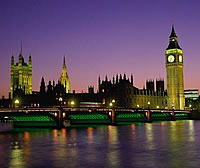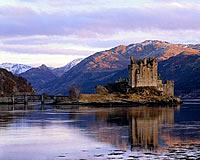| xx |
| cc |
| www.fretnotgospel.com/unitedkingdom.html |
| xx |
| SE |
| cc |
| SE |
| ee |
| 3RD INTERESTING THING ABOUT THE UNITED KINGDOM Traditional Christian churches are declining but evangelical churches are growing. Church-Goers - Only 11,000,000 out of 55,000,000 go to church regularly, even though 33,000,000 say they do. Many more than the 11,000,000 attend church on special occassions like Christmas Day, funerals, or weddings. By low, in schools, Christian worship is done. In schools, it is non-denominational. New Churches - Older churches, like many Church of England churches are shrinking and closing. Some of their buildings are turned into bars, stores, even pet shops, and mosques. A new kind of church has started in Great Britain, though. Hillsong church in the London Theatre is one of the biggest ones and there are many others. Hillsong is an Australian church that has mostly young people. It has two drum sets, four guitars, and two keyboards for praise and worship music. Hillsong is similar to my church, but much, much bigger. In Hillsong on Sundays, there's an hour of music then a longish sermon/Bible reading. They have three Sunday services. There is also a mid-week group which is a Bible study. Catholicism - There are 5,000,000 Roman Catholics. There are seven areas in the United Kingdom where most Christians are Catholic: four in England (especially Liverpool), two in Scotland (especially Glasgow), and one in Wales. Northern Ireland also has many Catholics but they aren't a majority. The Pope in Rome is the head of the worldwide Catholic Church. The Cardinal Archbishop of Westminster is the head of the Cathloic Church in United Kingdom. Catholics believe in praying to the Virgin Mary, and the Saints, as well as to God. Other Religions - There are 1,500,000 Muslims and 330,000 Jews. The book said that Muslim girls insist on wearing headscarves (hajibs), and being completely covered (wearing a burqa) when they are in school. Most Muslims in the United Kingdom are from Pakistan. There is a Muslim parliament that lets them have political place but they still have to obey British laws. The Qu'ran is the Islamic holy book. The United Kingdom has a small Jewish community too. There are two groups of Jews: the Ashkenazim from Europe, and the Sephardim, from Spain, Portugal, and North Africa. The Torah is the Jewish holy book, which is the first five books of the Bible. |
| United Kingdom |
| gg |
| aa Learning how to love everyone |
| Country of the Month Restaurant Jan 2003 - Armenia La Mediterranee, Berkeley Feb 2003 - Poland Old Krakow, San Francisco Mar 2003 - Ireland Kells, San Francisco Apr 2003 - Jamaica Jamaica Station, Oakland May 2003 - El Salvador Balompie, San Francisco Jun 2003 - Nepal Kathmandu, Albany Aug 2003 - Turkey Bosphorus, Berkeley Oct 2003 - Cambodia Angkor Wat, San Francisco Dec 2003 - Philippines Aroma Cafe, Concord Jan 2004 - Saudi Arabia Rihab's Bakery, Belmont Feb 2004 - Mexico El Huarache Azteca, Oakland Mar 2004 - Mongolia Col. Lee's Mongoilan BBQ, Mtn View May 2004 - Switzerland Fondue Fred's, Berkeley Jul 2004 - Afghanistan Da Afghanan Kabob House, Fremont |
| Country of the Month Restaurant Sep 2004 - Morocco Menara Moroccan, San Jose Nov 2004 - Portugal Souza's Restaurant, San Jose Jan 2005 - Thailand Saysetha, Oakland Mar 2005 - Tibet Taste of Himalaya, San Francisco Apr 2005 - South Korea Sahn's Korean Cafe, Oakland Jun 2005 - North Korea Jong Ga House, Oakland Aug 2005 - Japan Todai, Pleasanton Nov 2005 - Nicaragua Nicaragua, San Francisco Jan 2006 - United Kingdom The Crown Pub, Danville Mar 2006 - Scotland Cameron House, Half Moon Bay Apr 2006 - England The Englander, San Leandro Jun 2006 - Wales Pig and Whistle, San Francisco Sep 2006 - No. Ireland Beckett's Irish Pub, Berkeley Nov 2006 - Iran |
| ee |
| 1ST INTERESTING THING ABOUT THE UNITED KINGDOM Our language is very similar to theirs but theirs is funnier. Rhyming Slang - There is a way of talking called Cockney rhyming slang that is spoken in the East of London. It is a kind of slang where the slang word rhymes with its meaning. For example, "trouble and strife" means "wife". "Whistle and flute" means "suit" like on a businessman. "Ball of chalk" means "walk". "Dog and bone" means "telephone". "Sausage and mash" (like potatoes) means cash. "Jam jar" means "car". "Pen and ink" means "stink". It'll take a lot of sausage and mash to get the rotten milk in the jam jar to not pen and ink. Dialects and Accents - A Welsh person speaks English with a sing song sound and a Scot sounds almost gutteral. People from the West Country open their mouths wider when they say vowels and turn "s" into "z". A Middlander's accent sounds flat and nasal like if you pinched your nose a little. Near Derbyshire and Nottinghamshire, people turn "igh-i" sounds into "ee". The alarm clock went off two minutes past mid-neet. North of the Wash, people say their short "a" as "aaa", while people south of the Wash say their short "a" as "ahhhh". The car is driving too fahhhst. People call standard English the King's or Queen's English or the Received Pronunciation. Most announcers on BBC television speak the Queen's English. I watch the shows of the BBC announcer, David Attenborough, who narrates nature shows. I like how his speech sounds. Proper Names - British proper names may tell people about early ancestors. For example, there are familes with last names like London, Baldock, and Ashby, which are towns. There are also names like Hills, Brooks, or Bridges, which are places that families were named after. Some families in England are named as the sons of Peter (Peterson), William (Williamson), Donald (Donaldson), etc. In Scotland, "Mac" and "Fitz" mean sons of, like MacIntosh or Fitzwilliam. Fitzroy means royal (French 'roi') children born out of marriage. In Wales, "Ap" means "of". "Ap" turns to "P" in last names like Prichard, son of Richard, or Powell, son of Howell, or Pugh, son of Hugh. Some families are named after a job like Cooper, Weaver, King, Bishop, Fuller, or Walker. Some families are named after sayings or animals like Fox, Herring, Long, Black, Cruikshank, Goodenough, or Gough (red-haired). Some families are named after relationships like Fodder, Cousins, or Vaughn (younger). |
| ee |
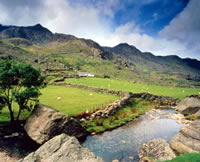 |
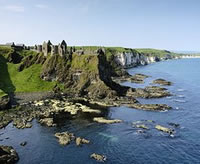 |
| ee |
| ee |
| References Books Cultures of the World - Britain Barbara Fuller, 1996, 128 pgs. Tarrytown, New York Internet Gaelic Phrase Book http://www.bbc.co.uk/ scotland/alba/foghlam/beag_ air_bheag/phrase_book.shtml Welsh-English Dictionary http://www.bbc.co.uk/ wales/learnwelsh/ BBC News - Theatre of God http://news.bbc.co.uk/1/hi/ magazine/4677440.stm The British Empire, A Survey http://pages.britishlibrary.net/ empirehist/history.html The Anti-Slavery Campaign in Britain http://www.victorianweb.org/ history/antislavery.html America: An Empire in Denial Niall Ferguson, The Chronicle Review, March 28, 2003 |
| Bird Names - The English language has a lot of names for flocks of birds. I think it's funny that they have so many: a siege of herons or bitterns, a plump of wildfowl, a gaggle of geese, a herd or swans or cranes, a bedelying of ducks, a sord or sute of mallards, a spring of teal, a company of widgeon, a cast of hawks, a bevy of quail, a covey of partridges, a muster of peacocks, a nye of pheasants, a brood of chickens, a covert of coots, a congregation of plovers, a desert of lapwings, a wisp or walk of snipe, a fall of woodcock, a bazaar of murres/guilimots a flight of doves or swallows, a murmuration of starlings, an exaltation of larks, a watch of nightengales, a building of rooks, a murder of crows, a chattering of chough, a host of sparrows. |
| 2ND INTERESTING THING ABOUT THE UNITED KINGDOM There are many other languages spoken in parts of the UK. Welsh - The Welsh language is spoken in Wales. A million people in Wales speak Welsh. It doesn't look or sound much like English. "J", "K", "Q", "V", "X", and "Z" do not appear in Welsh. "W" and "I" can be both vowel or consonant. Cymr'u means Wales. Aderyn means bird. Ceiliog means rooster. My ceiliog's name would be Main Jac (Slim Jack). Bwyta means eat. Gaelic - Only 75,000 speak Gaelic and it is spoken mostly in the Scottish Hilghlands. Gaelic is a Celtic language like Welsh. Karen NicMhathain is a Gaelic singer who plays in a band called Capercaillie, which is the name of the world's biggest grouse, which lives in Scotland. In Gaelic "John buys cars" is expressed as "Buys John cars". I am hungry is "Tha am t-acres orm?" Lallan - Lallan is the Scottish language now only considered a regional dialect. Some people call it Scots for short. The word for auction is "roup". The word for dull is "dreich" and for walking slowly is daundring". Around 1424 Lallan was used as the offical government language. Each area where Scots is spoken has its own dialect. Some of the Lallan words sound like owl names like "sheen", the plural for shoe, and "een", the plural for eye. Wi' mine een I saw a crow take mine sheen. |
| d Huge Empire Small Country - The British empire was one of the world's biggest empires but it doesn't exist anymore. From the mid-1700's to 1900, it was the biggest empire ever known. At that time, Great Britain was the strongest country in the world and yet it is so small! It had only 21,000,000 people in 1850. Commonwealth - The British empire began in 1600. It grew for a long time, and in the 1900's it started to fade away. In the 1930's, most countries under British rule were getting grumpy about it. In India there was an uprising. In the later 1900's many countries under British rule were made independent. By the mid-1970's the British empire faded into the commonwealth of nations, where independent nations that used to be in the empire still have a relationship between each other and the United Kingdom. Classes - The British empire made divides between rich and poor. It made a few people very very wealthy, made a lot middle class and the rest poor. It in part made the common feeling that "rich are better than poor" but that is not true. |
The British Empire. Colonies - The British empire had colonies on every continent including Antarctica, also on many island like New Zealand and New Guinea. Canada and some of the eastern United States were also colonies. Britain through of Ireland and some other areas of their empire as "uncivilized". The last big colony it had was Hong Kong, China. Trade - In land area, Great Britain is a tiny fraction of its empire was. It had huge colonies in Canada and the United States and Africa and India, and smaller ones all around the world. The main reason for the colonies was trade. It had another big colony in Australia including New Zealand and New Guinea. They sent their prisoners to the Australian colony. The East India Company was the reason for the spread of the empire. The company had armies and forts and ships and would war against anyone who would try to mess up its trade, like France, Spain, Russia, Armenia, the Netherlands, the Moghul of India, China and many others. |
The United Kingdom. x The United Kingdom is a nation made up of one-and-a-half main islands and many little islands off the northwest coast of Europe. The main island is called Great Britain. A part of another island called Ireland is Northern Ireland, which is part of the United Kingdom. Some of the smaller islands, called the British Isles, are the Outer and Inner Hebrides, the Orkney Islands, the Shetland Islands, the Isle of Man, the Isle of Wight, the Isles of Scilly, Jersey Island, and the other Channel Islands. The oceans that surround the United Kingdom are the North Atlantic, the Irish Sea between Ireland and England, the North Sea between Norway and Scotland, the English Channel between France and England, and St. George's Channel between Ireland and Wales. On Great Britain the main country is called England. To the west of England is the country of Wales and to the north is the country of Scotland. On Ireland, the country of North Ireland is part of the United Kingdom. On the rest of Ireland is the Republic of Ireland which is not part of the United Kingdom. |
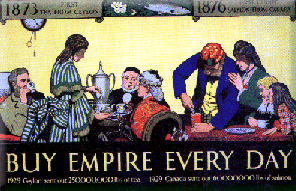 |
 |
| dd |
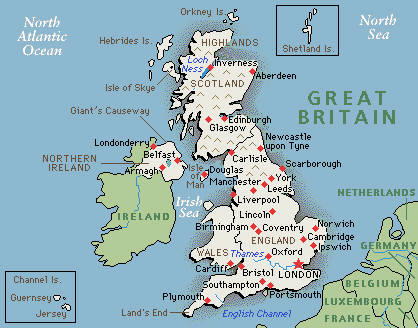 |
| dd |
| by Noah Arthur |
| Country of the Month |
 |
 |
 |
| East India Company Flag |
| 4TH INTERESTING THING ABOUT THE UNITED KINGDOM The British Empire profitted from the slave trade but it also was the first to end slavery. Racism - The British empire started the slave trade between African and America, later resulting in white people hating and mistreating black people. Some white people still have wrong ideas about black people thinking it's okay to mistreat them. Now there is much less racism and only some Africans and Arabs still keep slaves. Racism is not only between white and black people, but also between many other people. Abolition - William Wilberforce, an Evangelical Christian and member of Parliment, was a big part of the abolition of English (and West Indian) slavery. In slave ships, the slaves were given very little space or exercise, sometimes even chained down in the ship's hold. When they got to where they'd be sold (usually where sugar or cotton was grown), they were usually put into more very bad conditions. The first thing Great Britain abolished was the slave trade in getting more slaves in 1807. Later in 1833, when Wilberforce was dying, they completely abolished slavery in the Empire. Rule of Law - An Oxford professor wrote that the main benefits of the empire were that people eventually could choose about their lives and weren't in constant fear of the government; they could make a living through free trade and do that legally under rule of law. There was also much peace in the world then and they were strong enough to stand up to bad empires like the Germans and Japanese. |
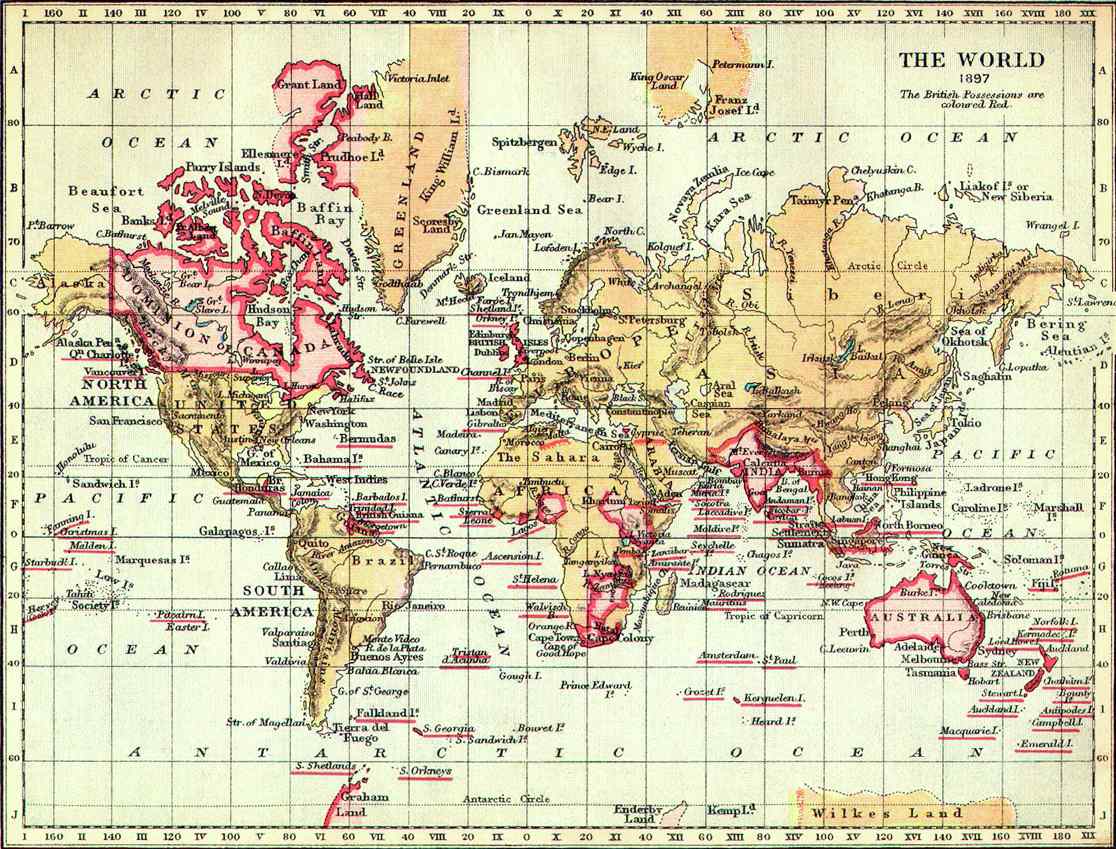 |
